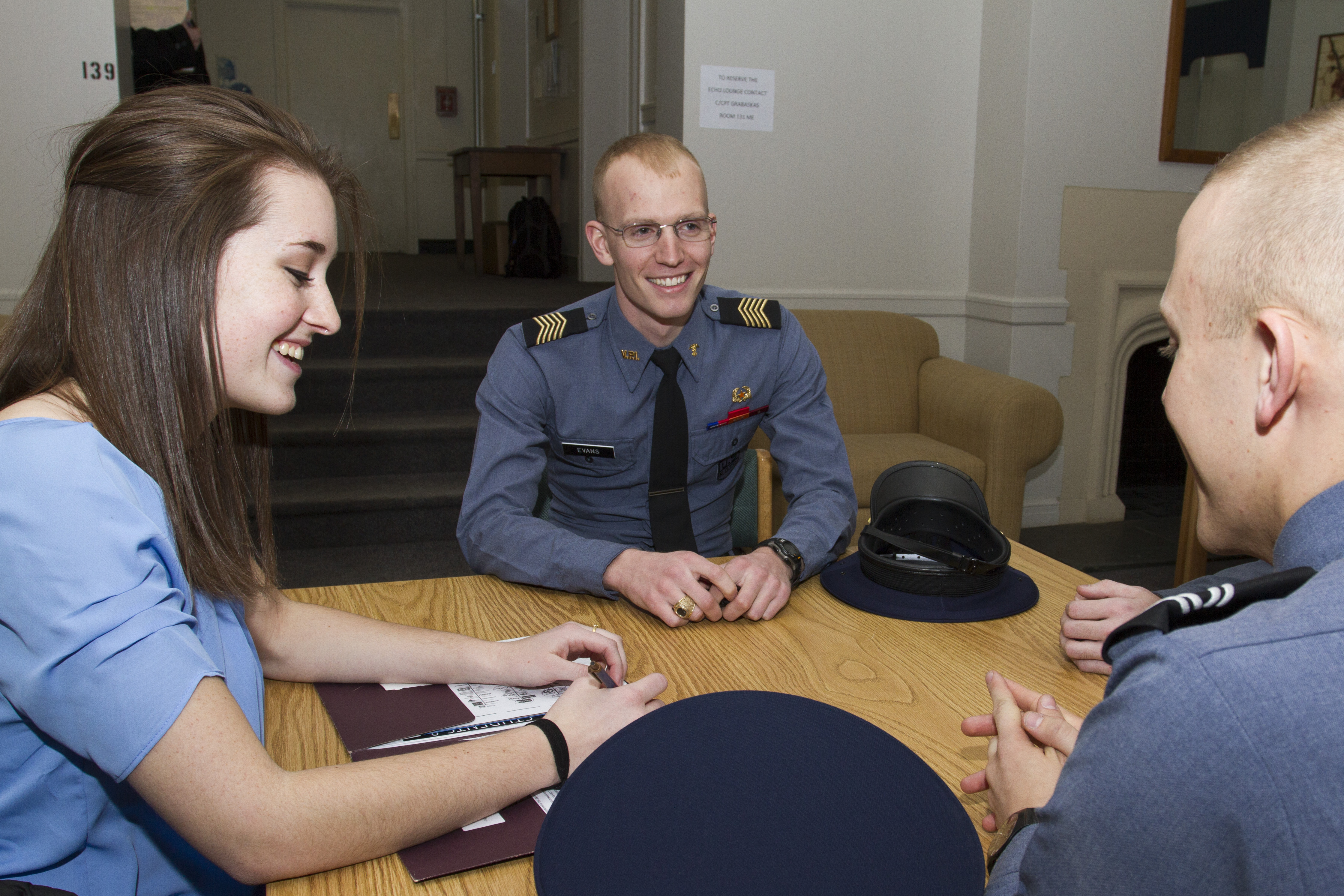Cadets and non-cadets join forces while new halls are built

While new residence halls are constructed, some members of the Virginia Tech Corps of Cadets are housed in the Lower Quad, sharing living space with civilians.
When Rasche Hall closed in summer 2013 and was razed last fall, it was the first step in the redesign of the Upper Quad to include state-of-the-art residence halls for more than 1,000 cadets. While the new buildings are under construction, members of the Virginia Tech Corps of Cadets 2nd Battalion are housed in the Lower Quad, sharing living space with other students.
Accustomed to a highly structured and disciplined approach, cadets wondered how it would work to live in close proximity to students who have a less rigorous routine. No doubt the non-cadets had questions, too.
“Most of the older cadets were a little nervous about the change,” said Regimental Commander Jordan Disney of Owings Mills, Md., a senior majoring in psychology in the College of Science who is pursuing a minor in leadership studies from the Virginia Tech Corps of Cadets Rice Center for Leader Development. “This was especially true of the commanders, as they had to try to maintain good order and discipline while fostering a positive learning environment between two very different communities. Regardless, the vast majority of cadets were very excited to share our customs and courtesies with a new audience.”
“With cadets living on Upper Quad and civilians living on the other side of campus, there’s always been a sort of disconnect. It has been nice seeing that gap close,” said Cadet Andrea Stone of Stafford, Va., a senior majoring in food science and technology in the College of Agriculture and Life Sciences who is pursuing a minor in leadership from the Virginia Tech Corps of Cadets Rice Center for Leader Development. “There was an adjustment period in the beginning, but the civilians have been very understanding. They know we have to get up early, and we know they’re still asleep when our day begins. Respecting the other’s sleeping pattern by keeping the noise in the halls down is key. No one likes to be awakened before their alarm.”
“Most of the time it is just like any other hall,” said Cadet Andrew Powers of Fairfax Station, Va., a graduate student studying public and international affairs in the College of Architecture and Urban Studies. “People respect each other’s time and study habits. There is a mutual respect between the cadets and civilians for each other’s time and space.”
As with any community, connections developed as interactions occurred and customs took shape. Most Sundays there is a pancake social held in the lounge of West Eggleston to encourage interaction between the communities. Both cadets and civilians use the lounge throughout the week to study and socialize.
“It’s a new experience for us both,” said Cadet Joshua Schnaitman of Stroudsburg, Pa., a senior majoring in political science in the College of Liberal Arts and Human Sciences who is pursuing a minor in leadership studies from the Virginia Tech Corps of Cadets Rice Center for Leader Development and who is currently serving as the 2nd Battalion executive officer. “Prior to moving to the Eggleston community I feel that the corps was often too removed from the happenings of the civilian side of campus. This offers the best of both world's for cadets ― a unique military training environment and the opportunity to co-mingle with other students who have unique lives of their own. Through the day to day direct contact we have been able to improve our relationship and rapport.”
Schnaitman’s civilian counterpart is West Eggleston Resident Advisor Angela Bladen of Westminster, Md., a sophomore majoring in dairy science in the College of Agriculture and Life Sciences. Schnaitman and Bladen are planning joint activities for spring semester, including a volleyball tournament and cookout.
“Fundamentally we are all the same, just here to study and excel in academics,” Schnaitman said.
Cadet Logan Whitmire of Virginia Beach, Va., a sophomore majoring in computer engineering in the College of Engineering, said, “I think one of the advantages of living on Lower Quad is being closer to the civilian student body. I find myself interacting with the civilian students much more this year than I did last year.”
Powers added, “This experience could be a wonderful opportunity to bridge the Corps of Cadets and the civilians in the future by having joint social functions and open houses. Cadets have been interested in seeing the type of life civilians live on a regular basis. I’m sure civilians feel the same way about cadets. In my personal opinion, opening up the Corps of Cadets and its traditions and functions would be very beneficial to the university, Hokie culture, and the overall well-being of the Corps of Cadets.”
Disney says he hopes some of the positive aspects of the experience endure even after the new corps residence halls are completed. “What I would like to carry over is the better understanding many West Eggleston non-cadets now have of the corps. I feel as though the majority of the civilians have a stronger appreciation and connection to the corps that I would like to carry on in the future.”
The first of two new Corps of Cadets residence halls is slated to open in the fall of 2015.
Written by Sandy Broughton.






